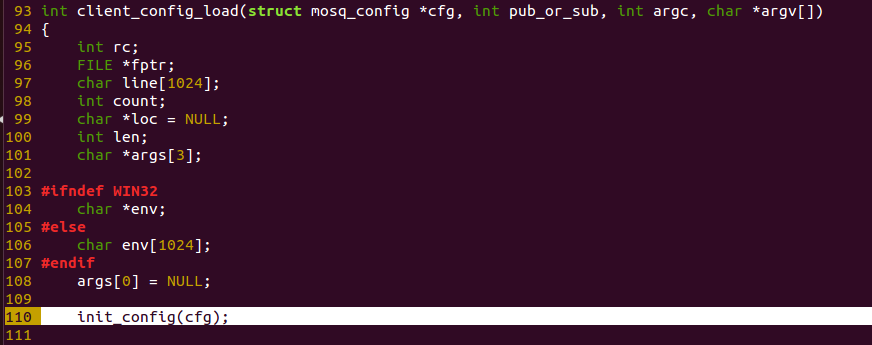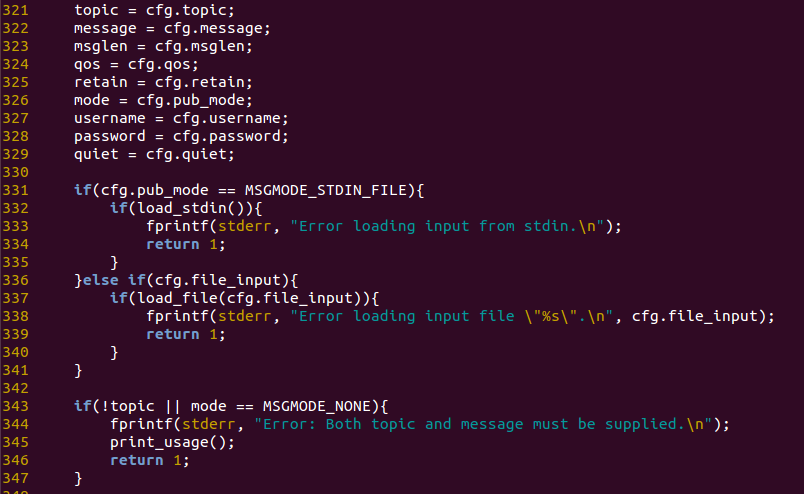MQTT 源码分析,搜索了一下发现网络上讲的很少,多是逍遥子的那几篇。
参看:逍遥子_mosquitto源码分析系列
参看:MQTT libmosquitto源码分析
参看:Mosquitto学习笔记
一、目录结构
首先我们还是来看一下 mosquitto-1.4.14 的源码目录结构

我们主要关注 client、lib、src 这三个目录。其中 src 和 lib 目录下主要放置 mosquitto 的实现代码以及部分底层与网络相关的操作,client 目录主要为两个客户端程序的实现源码。
我们主要就是来看看,这两个客户端的实现源码。
二、SUB 客户端源码

首先我们先看 sub_client.c
我们从 main 函数开始。

查看结构体:
结构体 struct mosq_config 主要为 MQTT 的配置信息
struct mosq_config {
char *id;
char *id_prefix;
int protocol_version;
int keepalive;
char *host;
int port;
int qos;
bool retain;
int pub_mode; /* pub */
char *file_input; /* pub */
char *message; /* pub */
long msglen; /* pub */
char *topic; /* pub */
char *bind_address;
#ifdef WITH_SRV
bool use_srv;
#endif
bool debug;
bool quiet;
unsigned int max_inflight;
char *username;
char *password;
char *will_topic;
char *will_payload;
long will_payloadlen;
int will_qos;
bool will_retain;
#ifdef WITH_TLS
char *cafile;
char *capath;
char *certfile;
char *keyfile;
char *ciphers;
bool insecure;
char *tls_version;
# ifdef WITH_TLS_PSK
char *psk;
char *psk_identity;
# endif
#endif
bool clean_session; /* sub */
char **topics; /* sub */
int topic_count; /* sub */
bool no_retain; /* sub */
char **filter_outs; /* sub */
int filter_out_count; /* sub */
bool verbose; /* sub */
bool eol; /* sub */
int msg_count; /* sub */
#ifdef WITH_SOCKS
char *socks5_host;
int socks5_port;
char *socks5_username;
char *socks5_password;
#endif
};
结构体 struct mosquito 主要用于保存一个客户端连接的所有信息,例如用户名、密码、用户ID、向该客户端发送的消息等
struct mosquitto {
mosq_sock_t sock;
#ifndef WITH_BROKER
mosq_sock_t sockpairR, sockpairW;
#endif
#if defined(__GLIBC__) && defined(WITH_ADNS)
struct gaicb *adns; /* For getaddrinfo_a */
#endif
enum _mosquitto_protocol protocol;
char *address;
char *id;
char *username;
char *password;
uint16_t keepalive;
uint16_t last_mid;
enum mosquitto_client_state state;
time_t last_msg_in;
time_t next_msg_out;
time_t ping_t;
struct _mosquitto_packet in_packet;
struct _mosquitto_packet *current_out_packet;
struct _mosquitto_packet *out_packet;
struct mosquitto_message *will;
#ifdef WITH_TLS
SSL *ssl;
SSL_CTX *ssl_ctx;
char *tls_cafile;
char *tls_capath;
char *tls_certfile;
char *tls_keyfile;
int (*tls_pw_callback)(char *buf, int size, int rwflag, void *userdata);
char *tls_version;
char *tls_ciphers;
char *tls_psk;
char *tls_psk_identity;
int tls_cert_reqs;
bool tls_insecure;
#endif
bool want_write;
bool want_connect;
#if defined(WITH_THREADING) && !defined(WITH_BROKER)
pthread_mutex_t callback_mutex;
pthread_mutex_t log_callback_mutex;
pthread_mutex_t msgtime_mutex;
pthread_mutex_t out_packet_mutex;
pthread_mutex_t current_out_packet_mutex;
pthread_mutex_t state_mutex;
pthread_mutex_t in_message_mutex;
pthread_mutex_t out_message_mutex;
pthread_mutex_t mid_mutex;
pthread_t thread_id;
#endif
bool clean_session;
#ifdef WITH_BROKER
bool is_dropping;
bool is_bridge;
struct _mqtt3_bridge *bridge;
struct mosquitto_client_msg *msgs;
struct mosquitto_client_msg *last_msg;
int msg_count;
int msg_count12;
struct _mosquitto_acl_user *acl_list;
struct _mqtt3_listener *listener;
time_t disconnect_t;
struct _mosquitto_packet *out_packet_last;
struct _mosquitto_subhier **subs;
int sub_count;
int pollfd_index;
# ifdef WITH_WEBSOCKETS
# if defined(LWS_LIBRARY_VERSION_NUMBER)
struct lws *wsi;
# else
struct libwebsocket_context *ws_context;
struct libwebsocket *wsi;
# endif
# endif
bool ws_want_write;
#else
# ifdef WITH_SOCKS
char *socks5_host;
int socks5_port;
char *socks5_username;
char *socks5_password;
# endif
void *userdata;
bool in_callback;
unsigned int message_retry;
time_t last_retry_check;
struct mosquitto_message_all *in_messages;
struct mosquitto_message_all *in_messages_last;
struct mosquitto_message_all *out_messages;
struct mosquitto_message_all *out_messages_last;
void (*on_connect)(struct mosquitto *, void *userdata, int rc);
void (*on_disconnect)(struct mosquitto *, void *userdata, int rc);
void (*on_publish)(struct mosquitto *, void *userdata, int mid);
void (*on_message)(struct mosquitto *, void *userdata, const struct mosquitto_message *message);
void (*on_subscribe)(struct mosquitto *, void *userdata, int mid, int qos_count, const int *granted_qos);
void (*on_unsubscribe)(struct mosquitto *, void *userdata, int mid);
void (*on_log)(struct mosquitto *, void *userdata, int level, const char *str);
//void (*on_error)();
char *host;
int port;
int in_queue_len;
int out_queue_len;
char *bind_address;
unsigned int reconnect_delay;
unsigned int reconnect_delay_max;
bool reconnect_exponential_backoff;
char threaded;
struct _mosquitto_packet *out_packet_last;
int inflight_messages;
int max_inflight_messages;
# ifdef WITH_SRV
ares_channel achan;
# endif
#endif
#ifdef WITH_BROKER
UT_hash_handle hh_id;
UT_hash_handle hh_sock;
struct mosquitto *for_free_next;
#endif
};
client_config_load 客户端配置负载
第二个参数,可选择选择是 PUB 还是 SUB
然后看到 init_config 函数

可以看到一些初始化配置
void init_config(struct mosq_config *cfg)
{
memset(cfg, 0, sizeof(*cfg));
cfg->port = 1883;
cfg->max_inflight = 20;
cfg->keepalive = 60;
cfg->clean_session = true;
cfg->eol = true;
cfg->protocol_version = MQTT_PROTOCOL_V31;
}
mosquitto_lib_init 初始化 (重点)

int mosquitto_lib_init(void)
{
#ifdef WIN32
srand(GetTickCount());
#else
struct timeval tv;
gettimeofday(&tv, NULL);
srand(tv.tv_sec*1000 + tv.tv_usec/1000);
#endif
_mosquitto_net_init();
return MOSQ_ERR_SUCCESS;
}
这里有个时间戳函数 gettimeofday,参看:C语言再学习 -- 时间函数
所在文件 mosquitto-1.4.14/lib/mosquitto.c 所以说需要链接动态库 libmosquitto.so.1

client_id_generate 生成客户端 ID
其实就是我们讲MQTT服务器的时候,订阅主题然后在服务器上多出的那一行信息。
里面的 mosqsub|2431-ubuntu 就是客户端 ID。这个函数就是干这个。
1502159601: New client connected from 127.0.0.1 as mosqsub|2431-ubuntu (c1, k60)
mosquitto_new 新建一个 mosq。(重点)

看了一下这个函数里面就是一些初始化的东西
然后可以看到它也是在 lib 目录下定义的。所以说需要链接动态库 libmosquitto.so.1。其他不用改。

client_ipts_set 各种设置。懒得看...

一些调试信息
以及订阅回调设置 mosquitto_subscribe_callback_set (重要)
连接回调设置,和信息回调设置(重点)
这两个函数都是在lib目录下定义的。里面都是有互斥锁的。
client_connect 客户端连接

int client_connect(struct mosquitto *mosq, struct mosq_config *cfg)
{
char err[1024];
int rc;
#ifdef WITH_SRV
if(cfg->use_srv){
rc = mosquitto_connect_srv(mosq, cfg->host, cfg->keepalive, cfg->bind_address);
}else{
rc = mosquitto_connect_bind(mosq, cfg->host, cfg->port, cfg->keepalive, cfg->bind_address);
}
#else
rc = mosquitto_connect_bind(mosq, cfg->host, cfg->port, cfg->keepalive, cfg->bind_address);
#endif
if(rc>0){
if(!cfg->quiet){
if(rc == MOSQ_ERR_ERRNO){
#ifndef WIN32
strerror_r(errno, err, 1024);
#else
FormatMessage(FORMAT_MESSAGE_FROM_SYSTEM, NULL, errno, 0, (LPTSTR)&err, 1024, NULL);
#endif
fprintf(stderr, "Error: %s\n", err);
}else{
fprintf(stderr, "Unable to connect (%s).\n", mosquitto_strerror(rc));
}
}
mosquitto_lib_cleanup();
return rc;
}
return MOSQ_ERR_SUCCESS;
}
可以看到里面又有几个重要函数
mosquitto_connect_srv
mosquitto_connect_bind --> _mosquitto_connect_init

然后不断回环,里面的参数自己看。
最后是 mosq 的销毁和库的关闭。(重点)

到此结束!!
三、PUB 客户端源码
接下来来看 pub_client.c 有一些相同部分我就不再重复了。
client_config_load 客户端配置负载
第二个参数,可选择选择是 PUB 还是 SUB

一些配置信息的比较

mosquitto_lib_init 初始化 (重点)


client_id_generate 生成客户端 ID
mosquitto_new 新建一个 mosq。(重点)

调试信息这里面就没有了订阅回调设置 mosquitto_subscribe_callback_set

然后这里看这里,是有区别的。(重点)

connect、disconnect、publish. 这些回调设置

client_ipts_set 各种设置。懒得看...
client_connect 客户端连接

回环开始、结束

最重要的来了,do while循环里的发布内容 (重点)

这里的 qos 就是消息发布服务质量级别。

然后还有 retain 用于区分新老订阅者
RETAIN标志位只用于 PUBLISH 消息,当服务器收到某个主题的 PUBLISH 消息时,如果RETAIN标志位为1,则表示服务在将该消息发送给所有的已订阅该主题的订阅者后(发送前服务器将RETAIN标志置为0),还需保持这条消息,当有新增的订阅者时,再将这条消息发给新增的订阅者;如果RETAIN标志位为0,则不保持消息,也不用发给新增的订阅者。
目的:
1.将RETAIN标志位置为1,可使新的订阅者收到之前保持的或上一个确定有效的消息。
2.区分新订阅者(RETAIN标志为1)和老订阅者(RETAIN标志为0)
源码中这两个参数的设置都是 0

最后是 mosq 的销毁和库的关闭。(重点)

---------------------
作者:聚优致成
来源:CSDN
原文:https://blog.csdn.net/qq_29350001/article/details/77161537
版权声明:本文为博主原创文章,转载请附上博文链接!